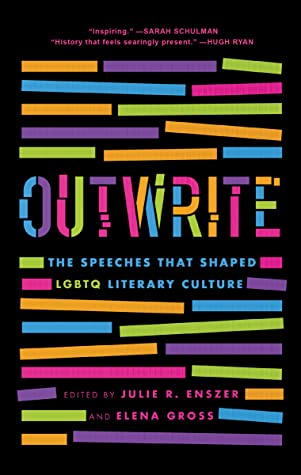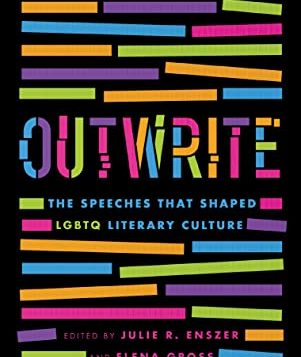 OUTWRITE
OUTWRITE
The Speeches that Shaped LGBTQ Literary Culture
Edited by Julie R. Enszer and Elena Gross
Rutgers University Press. 342 pages, $26.95
ANYONE who remembers the OutWrite literary conferences that spanned the 1990s—and anyone who didn’t attend but wonders “What did I miss?”—will be fascinated by this important addition to LGBT literary culture and history. OutWrite was far from the first gay or lesbian literary conference—the Lesbian Writers Conference, for example, took place annually in Chicago between 1974-1978—but OutWrite was the first to receive national attention.
The first two OutWrite conferences were held in San Francisco, sponsored by OUT/LOOK magazine; the remaining six were held in Boston, sponsored by Bromfield Street Educational Foundation, the publisher of GCN (Gay Community News). The editors of OutWrite: The Speeches That Shaped LGBTQ Literary Culture, Julie Enszer and Elena Gross, focus mostly on reprinting the keynote speeches, but the book also includes other material, notably a history of OutWrite, a brief rundown of the political in-fighting that plagued OutWrite’s various factions over its decade-long run, and excerpts from spoken-word performances and non-keynote addresses. There’s also a substantial “Notes on Contributors” section. Not all the speeches given at OutWrite conferences were recorded or previously published, but those that are included here were found either on-line or in archival collections.
The specter of hiv/aids hangs heavy over this book, with the editors mentioning the number of writers who had accepted invitations to speak but then became too sick to attend. Poet and novelist Melvin Dixon’s 1992 keynote, “I’ll be Somewhere Listening for My Name,” is particularly moving. Every OutWrite conference that I attended in Boston included a roll call of deceased members of the LGBT literary and arts community, which was unforgettable. Dixon died about six months after his appearance.
John Preston, a prolific writer in many genres but best known as a pornographer, also died about six months after his autobiographical keynote address, titled “An Exceptional Child,” in 1993. It was one of his last public appearances. There were laugh-out-loud speeches, too. In her 1993 keynote, poet-activist Chrystos mentioned what all attendees knew about OutWrite being quite the cruisy event, and said that she knew she wasn’t allowed to give out her room number over the microphone. At that, “the audience laughed uproariously,” note the editors. There was concrete advice for writers, too. Dorothy Allison, in her 1992 keynote, offers techniques and tips on how “to write the story you were always afraid to tell.”
When I look back at my heavily marked-up OutWrite programs and reread the articles I’d written about it, I’m reminded that as wonderful as many speeches were, they were only part of what made OutWrite so memorable. There were educational sessions, workshops, panel discussions (many of which were recorded on audiocassette and offered for sale on-site), breakout sessions for affinity groups, vendor tables, off-site readings, pre- and post-event parties and dinners. There are, of course, other LGBT-focused literary festivals still going on, both within and outside the U.S., such as the Saints and Sinners Literary Festival in New Orleans and the Rainbow Book Fair in New York, but OutWrite still holds a unique place.
__________________________________________________________
Martha E. Stone is the literary editor of this magazine.






